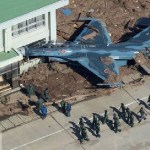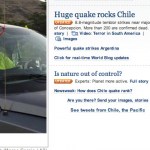earthquake
"Prediction is very difficult, especially if it's about the future." -Niels Bohr
What's going to happen next? It's perhaps the most important thing to know if we want to be prepared for practically anything in our lives. And without even thinking about it, most of us are actually very good at this in a huge number of aspects of our lives. For example...
Image credit: Crazy Adventures in Parenting.
I was hungry at work today, and I was prepared for it. Somehow, I knew that I was going to need food throughout the course of the day, and so I was prepared for it by bringing food from…
Given how many bloggers have already weighed in on the story of an Italian court convicting geologists of manslaughter for failing to issue adequate earthquake warnings before an earthquake that devastated the town of L'Aquila, including Steve Novella, Daniela at Skepchicks, Sharon Hill at Skeptic, and even Instapundit, you'd think that even Orac wouldn't have anything to say about it. You would, of course, be wrong. Orac always has something to say about such things. The question is simply whether he decides he's interested enough in the story to take the time and effort to compose and let…
Two years ago, a 7.0 earthquake struck Haiti, killing 300,000 Haitians and leaving 1.5 million homeless. Nine months later, a cholera epidemic began -- its first victim a 28-year-old man who bathed in and drank from a river that was likely contaminated by raw sewage from an encampment of UN peacekeepers from Nepal. Half a million people have been stricken by cholera since then, and 7,000 have died. New cases are being reported at a rate of roughly 200 per day.
Cholera is also spreading in the Dominican Republic, which shaires the island of Hispaniola with Haiti. Officials from CDC, UNICEF,…
We get little earthquakes all the time in OK. This is my usual reaction:
Department mates running into the hallway: OMFG WHAT WAS THAT???
Me: Wat?
Department mates: HOLY CRAP THAT WAS AN EARTHQUAKE!!
Me: ... I didnt feel anything... ... ... Thats what she said.
But this Saturday we had the strongest quake in OK history:
Magnitude 5.6 - OKLAHOMA
2011 November 06 03:53:10 UTC
This was my reaction this time:
Me in bed watching TV
*earthquake*
Me closing my eyes and holding my breath until its over, silently hoping it is an earthquake and not something worse.
Arnie making a bee-line for the…
It will probably be some years before we get the full story of what happened at the Fukushima Daiichi reactor complex after the earthquake.
Information has not exactly been put out coherently or comprehensively, but we can make some inferences from the data that is out there.
It is likely that one or two reactor vessels were breached with release of fuel and radioactive ash into the containment vessel.
There are a lot of nuclear agencies in Japan:
the JAEA - Japan Atomic Energy Agency - whose online environmental radiation monitors are now online (Oarai is the interesting one, between…
One day I was walking along a path dedicated to philosophers in Kyoto, Japan, with my friend Hitomi. It was interesting that there even was a path dedicated to philosophers. It made me think deeply about paths, which at the time was the subject of my PhD Thesis. Suddenly, earning a Doctorate of Philosophy with a specialization in Paths made sense. But that feeling wore off quickly enough when we something rather unusual unexpectedly appeared in the sky.
First, we heard it. A thump thump thump sound. Then we noticed other people looking up and in one direction, so we looked too. We…
In the early hours of March 11th, a 9.0-magnitude earthquake struck northern Japan, and a massive tsunami followed. More than 5,000 people are dead and almost 10,000 are missing. Hundreds of thousands are homeless, and those living near the Fukushima Daiichi Nuclear Power Station have been told to evacuate - while a small crew of brave workers remains nearby to try and avert catastrophic meltdown.
Here in the US, our budget debates highlight differing opinions about how much we want our government to do for us. The stories we tell ourselves make a virtue of self-sufficiency, and we highlight…
there are a number of questions that need answer regarding the situation at the Fukushima Daiichi nuclear reactor, aka Fuk-D.
As a starting point, here is an amateur online feed of radiation in Tokyo (Park18).
It is a geiger-counter, the normal count rate is 10-20 cpm, around noon on march 15th the count rate peaked at about 120 cpm, the counts then dropped before there was another broad rise on march 16th to about 40 cpm.
The first question is: why am I having to link to an amateur with a geiger counter?
The Japanese Atomic Energy Authority has four online environmental radiation monitors.…
As world watches Japan's nuclear plants, damage to manufacturing infrastructure poses chemical risks
By Elizabeth Grossman
After posting yesterday's story, I began to learn what a hub of chemical-intensive industry the region of Japan most directly affected by the earthquake an tsunami is. Hit with varying degrees of damage from the earthquake and tsunami are more than a dozen major petrochemical plants, most, according to a March 14 Goldman Sachs memo to investors, built in the 1970s. In addition, numerous factories that manufacture agrochemicals, silicon wafers, semiconductors, photovoltaic cells, and other high-tech items have all suffered damage as have warehouses and shipping container…
by Elizabeth Grossman
Even before news of the crisis at the Fukushima and other Japanese nuclear power plants damaged by Friday's massive earthquake and tsunami arrived, raising public health concerns to an alarming level, the scenes of destruction prompted many questions about how public health - and that of first responders - would be protected during immediate rescue efforts, and later as clean up and restoration get underway. The awful loss of life demands much of our attention, but it's also essential to consider future health issues for those working on rescue and recovery.
Right now…
One year after a 7.0-magnitude earthquake killed more than 200,000 Haitians and left 1.5 million homeless, conditions in the Western Hemisphere's poorest nation are still grim. Cholera has killed 3,600 people and weakened many more; the UN warns that 650,000 may be affected over the next several months, and the death rate from the disease is an "unacceptably high" 3.6%. Elections in November were accompanied by widespread charges of fraud and voter intimidation, and it's still unclear which candidates will face off in an upcoming runoff.
More than a million Haitians still live in makeshift…
Flooding in Pakistan has killed 1,600 and is affecting an estimated 20 million people. Six million lack access to food, shelter, and water. The report of a single confirmed cholera case (in the Swat valley) is generating some headlines, but the important point is that a lack of clean water makes the spread of any diarrheal disease far more likely.
UNICEF warns that "more than 3 million children are at high risk of deadly water-borne diseases in Pakistan," and cites a WHO projection of up to 1.5 million cases of diarrheal diseases that could occur over the next three months. These aren't just…
For the first few weeks after a 7.0 earthquake struck Haiti on January 12th, Haiti seemed to be on everyone's mind. Six months later, many of us think little about the quake survivors who are still struggling. In an op-ed in today's New York Times, Prime Minister Jean-Max Bellerive of Haiti and Bill Clinton, co-chairs of the Interim Haiti Reconstruction Commission, report, "only 10 percent of the $5.3 billion pledged by governments at a United Nations conference in March has been disbursed to the Haitian government. Without reliable schedules for disbursement, the commission is unable to plan…
Cleaning up some news ... busy week leading up to a field trip I am helping co-lead to Death Valley next week.
Ubehebe Crater in Death Valley, California
First off, I want to say how amazed I am at the great discussion that went on all weekend about the signs of potential activity in Iceland. It now appears that the earthquakes at Eyjafjallajökull may be waning, however the levels of seismicity have definitely bounced up and down over the last few days. However, the level and depth of the conversation is a testament to all volcanophiles out there. Nice job, folks.
For those of you into…
News!
Toba caldera in Indonesia.
We're all still talking about the Chilean earthquake and the coverage of the event. If you happen to live in the Columbus area, you might have heard me on WTVN talking about the earthquake as well.
The Toba (Indonesia) eruption 74,000 years ago has been used by some researchers to be the cause of a "genetic bottleneck" for humans - however, that is still much debated. Currently, excavations are under away near Toba to look for evidence of human habitation that was buried by the eruption. The evidence of stone tools that appear to be made by the same human…
I knew I could count on my fellow Science Blogger Dr. Klemetti for a good take on the physical reality of the Chilean Earthquake, so I checked in this morning, only to see him, quite property, take the MSM to task for inane rhetoric, notably an MSNBC headline that reads "Is Nature Out of Control?"
Klemetti rightly observes that this is bad science. He points out:
Earthquakes happen, and they happen in a random distribution (more or less), meaning sometimes we get more, sometimes less. Spend any time looking at the USGS earthquake feed and you'll see sometimes we have lots of M3+ earthquakes…
Screen capture of the MSNBC website on February 27, 2010 at ~5:30 PM eastern time.
Most of you have probably already heard about the magnitude 8.8 earthquake that struck today off the coast of Chile. This becomes one of the most powerful earthquakes on record and so far, the death toll has been relatively low - in the hundreds - especially compared to the horrific disaster of the Haiti earthquake from earlier this year. My thoughts go out to all in Chile recovering from the earthquake.
However, I am a little appalled at some of the coverage I've seen for this earthquake. MSNBC has become the…
Pity the poor Haitians.
Not only is their nation dirt poor, but to kick off 2010, they suffered an earthquake that killed approximately a quarter of a million people, left at least 300,000 injured, and resulted in 1,000,000 homeless. Huge swaths of its capital of Port au Prince and Léogâne, among other cities, had been leveled. The devastation was (and remains) almost beyond comprehension, and it will be years, if not decades, before Haiti can recover. Disease and hunger are rampant. In the immediate aftermath, looting and violence were common.
Unfortunately, disaster seems to attract…
In many ways the enormous outpouring of support for Haiti after the earthquake was very moving. In other ways, not so much - consider the International community's total lack of interest in whether Haitians will be able to feed themselves in the upcoming year - "We're very happy to send our surgeons, engineers and food aid - but hey, when we're done, we're done" seems to be the dominant worldview, as the UN reports:
"At a time when Haiti is facing a major food crisis we are alarmed at the lack of support to the agricultural component of the Flash Appeal," UN Food and Agriculture Organization…


